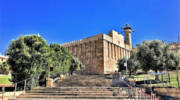An award winning Iranian film-maker will appear in the Jerusalem Festival featuring a film that explores the Bahai community in Israel.
Mohsen Makhmalbaf, an Iranian film maker and member of the Iranian political opposition who has won some 50 awards, will be an honorary guest at the Jerusalem International Film Festival, where his most recent film “The Gardener” will appear. Makhmalbaf is coming to Israel despite the fact that he could face up to five years in prison for such a visit should he ever decide to return to Iran. The Gardener is the first Iranian film since the 1979 Iranian Revolution to be filmed within Israel.
According to Makhmalbaf, he made this film in Israel “just to provoke the fundamentalist elements in my country.” The Jerusalem Film Festival will also show some of Makhmalbaf’s other films, including Gabbeh, Kandahar, and Salam Cinema. According to the Jerusalem International Film Festival website, “the Jerusalem International Film Festival remains one of the few platforms that present the world’s finest contemporary cinematic trends to its local audiences.”
THE GARDENER PROMOTES INTER-RELIGIOUS TOLERANCE
The Gardener is a thought-provoking fine art film that breaks a number of taboos that exist within Iranian society today. In addition to portraying Israelis in a humanizing manner, Makhbalbaf explores Bahai beliefs and the Bahai community living within the State of Israel, while showing beautifully vivid scenes of Bahai holy shrines located within the Jewish state.
While there are six million members of the Bahai faith worldwide, the religion is heavily persecuted in Iran, where the Iranian government views Bahai faith membership to be equivalent to apostasy and heresy. Even though the Bahai faith was founded in Iran, members of the Iranian Bahai community face unwarranted arrests, beatings, torture, rapes, unjustified executions, destruction of property, and a series of other human rights abuses. Making a film about the Bahai faith is also considered a criminal offense in Iran, thus transforming Makhmalbaf into a fugitive as far as the Iranian government is concerned.
Makhmalbaf, by making this film, seeks to counteract the misrepresentation of the Baha’i community by the Iranian government by showing the Bahai faith as a peace-loving religion whose ideas are worthy of being explored from an objective perspective. This film ultimately serves as a social-advocacy film like his previous work “Afghan Alphabet” that succeeding in changing Iranian education-law, enabling millions of Afghan refugee children to attend schools in Iran. In addition, by showing a scene where Israeli soldiers are shown laughing, having cast members appear at the Western Wall wearing a kippah, and showing vivid scenes of religious shrines in Israel coexisting beside one another, the film also questions the need for hatred to exist between Iranians and Israelis.
The Gardener also focuses on the controversy surrounding religion. In the film, Makhmalbaf and his son debate the role of religion in society and how it relates to war, peace and politics. Makhmalbaf argues that it is very important for the world to have religion since it is such a powerful force, while his son disagrees, claiming that Islamist groups such as the Taliban have corrupted religion beyond repair, by turning children into terrorists and oppressing women.
By Rachel Avraham, staff writer for United with Israel
Do You Love Israel? Make a Donation - Show Your Support!
Donate to vital charities that help protect Israeli citizens and inspire millions around the world to support Israel too!
Now more than ever, Israel needs your help to fight and win the war -- including on the battlefield of public opinion.
Antisemitism, anti-Israel bias and boycotts are out of control. Israel's enemies are inciting terror and violence against innocent Israelis and Jews around the world. Help us fight back!






















